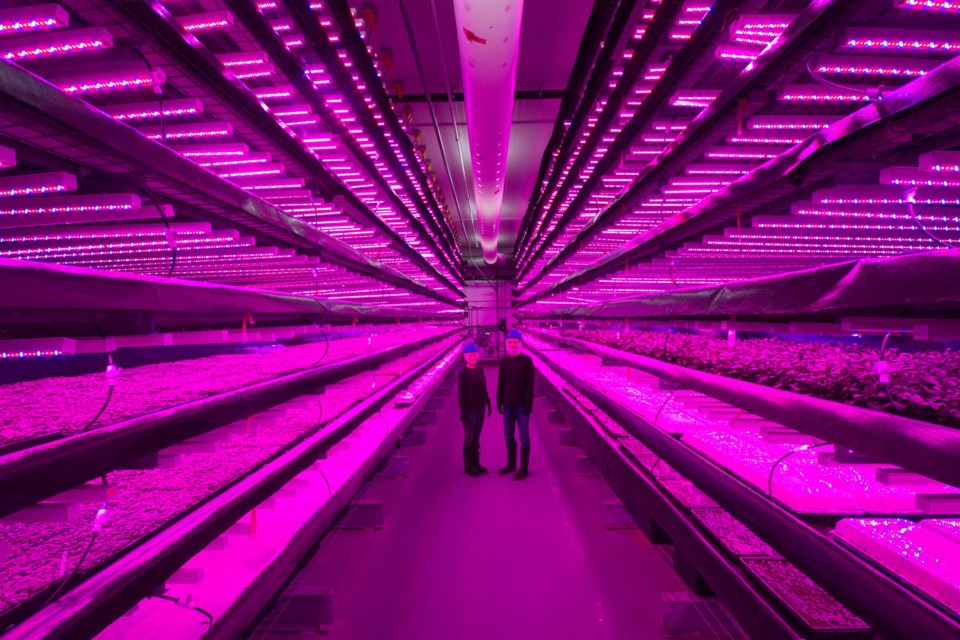It’s not your typical farm.
In an industrial park in Guelph, GoodLeaf Farms, a 4,000-square-metre indoor vertical farm, is now fully operational.
Guelph Mayor Cam Guthrie and MP Lloyd Longfield helped to celebrate the occasion with a recent tour to the facility.
“Guelph is embracing the circular food economy and it’s actually happening here. I’m so impressed,” Guthrie said.
GoodLeaf Farms was founded in Halifax in 2011 and has been in Guelph since 2019.
The state-of the-art farm is fully automated and equipped to grow microgreens and baby greens 365 days a year, without the use of pesticides, herbicides or fungicides and with substantially less water consumption.
GoodLeaf Farms works in collaboration with the University of Guelph, Dalhousie University and Acadia University.
Vertical farming is an innovative growing process that naturally grows plants with hydroponics with specialized LED lighting that concentrates the waves from the light spectrum which plants require to maximize photosynthesis.
The vertical farm also uses 95 percent less water than a traditional farm with no run-off issues or potential contamination concerns.
“The only water that leaves the building is in the plants,” says Jacquie Needham, accounts manager at GoodLeaf Farms.
The result, she says, is a more nutrient dense and sustainably grown food source, providing a domestic alternative in grocery isles highly dominated by imports.
“Knowing where our food comes from is important to Canadians,” says Needham.
“Our growing system mimics the spring sun without the use of chemicals, releasing farming from the restrictions of the changing seasons. We can grow, local, fresh, nutritious and healthy leafy greens for the Ontario market all year long – we do it safely.”
GoodLeaf Farms currently grows four microgreens and two baby green products available in Ontario and can be found on local grocery shelves at all Loblaws banners including Zehrs and Fortinos and will soon be available at Longo’s.
“People are becoming more and more aware of where their food comes from and especially now with the pandemic, people are looking for other food options. They are recognizing the importance of food security and buying local has become so important,” Needham said.
“This is an evolution of agriculture and we are so proud to be local.”
Being local eliminates long food shipments and more food can be grown per acre reducing land use pressures.
“What’s really unique here is that we can grow food 365 days a year,” Needham says.
“This isn’t to go against traditional farming. It’s just enhancing how we can get fresh food and supply it locally. And we are just thrilled to have found ways that are safe and innovative in growing food.”
GoodLeaf Farms says that it is a leader in safety. Every crop is tested for contaminants before it is shipped.
“We have safety standards here where food is tested and cleared two days before packaging,” Needham says.
The growing cycle at the facility is between six and 20 days, from ‘seed to shelf’.
“Our micro greens will germinate for two days and are grown in six days. Then they are held and tested for two days. They are packaged and then on the tenth day, they are off to Loblaws for distribution,” Needham says.
“This might be daunting for some, but we are enhancing plant potential through lighting and water and lots of the variables are controlled.”
Air is circulated every 11 minutes during the growth cycle.
“We are basically speeding up natural growth by about 40-50 per cent, so it’s a speedier cycle time which allows us to test and try new things,” Needham said.
Over 800,000 lbs of leafy greens are produced a year.
“Leafy greens are so important and traditional farmers can’t grow them all year,” Needham says. “And people are cooking more and more at home. They are experimenting and consumers are more interested in finding recipes that include healthy leafy greens.”
All products are GMO-free.
Sweet and crisp pea shoots are popular with children adding a fresh bite to salads. And baby arugula, a spicy and peppery green, makes an ideal topping for sandwiches and burgers. Other available greens include, baby kale, micro arugula, a micro Asian blend and a spicy mustard medley.
“This has been an interesting endeavor and it is continuously evolving. Technology is meeting agriculture and we are learning so much,” Needham said.
There are currently about 50 employees working at GoodLeaf Farms in Guelph.
“Guelph has such a great pool of people in agriculture, so we’ve had wonderful workers throughout different aspects. It’s been a great opportunity for growth,” says Needham.
GoodLeaf Farms hopes to expand with new farms throughout Canada.
“Right now, we are just so happy to be in Ontario so we can focus on the local market and get it customers quickly and at it’s freshest,” Needham says.
After walking along a sea of green, under a pink fluorescent light, Mayor Guthrie was eager to take a bite of some leafy greens.
“I’m glad Guelph landed this. It’s a test to what Guelph has to offer and the partnership with the University of Guelph, it’s amazing,” Guthrie said.
“The safety, cleanliness and all of the protocols put in place here, it’s really incredible. And the end-product tastes great too.”


.png;w=120;h=80;mode=crop)
